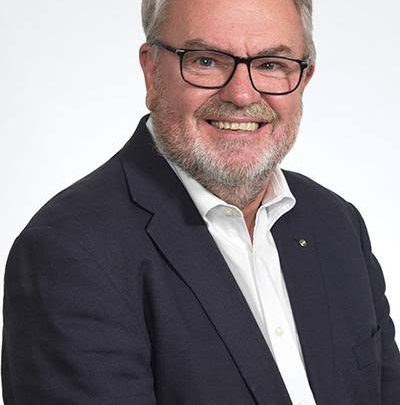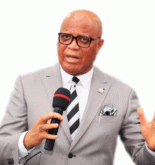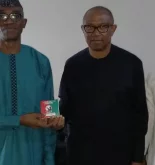By: John Kofi Mensah
Members of the Rotary Clubs in West Africa have been asked to fight the malignant epidemic of corruption in the sub-region, just as they fought the wild poliovirus to a halt.
Musikilu Mojeed, the Editor-in-Chief of Premium Times, one of Nigeria’s best investigative newspapers, gave the charge earlier this week while speaking to members of the Rotary Club of Accra North, Ghana.
The Club’s President, Thomas Shabashie, while introducing the guest speaker said there was an urgent need for leaders of the West African sub-region to tackle the menace of corruption.
According to him, the topic: “Stealing from the Poor: The West Africa’s Corruption Epidemic,” and the resource person were carefully selected to address what has become an existential threat not only to the sub-region but the entire continent.

Musikilu Mojeed, Editor-in-Chief, Premium Times Newspaper, Abuja
Speaking, Mr. Mojeed, who also serves as Nigeria’s Country President of the International Press Institute (IPI), lamented that West Africans have been sufficiently impoverished by the political class to the extent that they could do anything just to get by.
Citing reports from the United Nations Office for Drugs and Crimes (UNODC) and Transparency International, respectively, he said that the sub-region is the most corrupt in the entire world.
He argued that every problem afflicting the area stems from corruption and that unless immediate action was taken to change the situation, West Africa—and all of Africa—would be doomed.
“Tackling corruption is very important because it is at the root of almost all the problems we are having in the sub-region. It is also something we should not get tired of talking about,” he said.
West Africa’s epidemic of corruption
“The Corruption Perception Index provides the scores of every country from zero to hundred and over 180 countries are ranked. If a country scores between 100 – 80, it can be said to be clean. But African countries have usually been shown to be highly corrupt,” said Mr. Mojeed.
| S/N | Country | Percentage | Ranking |
| 1. | Republic of Benin | 43/100 | 72/180 |
| 2. | Burkina Faso | 42/100 | 77/180 |
| 3. | Cape Verde | 60/100 | 35/180 |
| 4. | Gambia | 34/100 | 110/180 |
| 5. | Ghana | 43/100 | 72/180 |
| 6. | Guinea | 25/100 | 147/180 |
| 7. | Guinea Bissau | 21/100 | 164/180 |
| 8. | Ivory Coast | 37/100 | 99/180 |
| 9. | Liberia | 26/100 | 142/180 |
| 10. | Mauritania | 30/100 | 130/180 |
| 11. | Mali | 28/100 | 137/180 |
| 12. | Niger | 31/100 | 123/180 |
| 13. | Nigeria | 24/100 | 150/180 |
| 14. | Senegal | 43/100 | 72/180 |
| 15. | Sierra Leone | 34/100 | 110/180 |
Extracted from TI’s Corruption Perception Index, 2022
Apart from Cape Verde which scored 60 percent, he said that no other West African country scored up to 50 percent and none is in the top 70, adding that the 2021 ranking was equally poor.
Continuing, he said, “Part of the problem of the rampant poverty and instability in the sub-region is largely due to corruption. Since I am talking to the Rotary Club where my audience is largely Ghanaians, I want to talk a little more about Ghana.
“Perhaps, I might be telling you what you already know but we can never get tired of talking about corruption. Apart from the TI index, the United Nations Office on Drugs and Crimes (UNODC) also released a report in 2022, indicating that despite the National Anti-Corruption Action Plan adopted in 2014, corruption remains rampant in Ghana and most of West Africa and Africa. But that of West Africa is much more endemic.
“Under the prevalence of bribery, the UNODC report indicates that 26.7 percent of adult Ghanaians paid a bribe to a public official in 2021. That’s huge. The report went on to report the prevalence of bribery by the employment status of bribe payers, meaning that even when you’re employed, you still must pay the bribe to get service. Under salaried employed persons in the private sector, 37.8 percent said they paid a bribe to get service.
“In total, more than 17.4 million bribes were paid in 2021 according to the UNODC report. The type of bribe people pay, according to the same report, showed that police officers are the most corrupt, followed by the Ghana Immigration Service and the Ghana Revenue Authority coming next.
“What these data tell us is that the government is losing a lot of revenue. Monies that should have come as revenue to the Government of Ghana go into private pockets of either police, immigration or revenue officers, doctors, nurses, elected officers, and so on.”

Thomas Shabashie, President, Rotary Club Accra North
Thomas Shabashie, President, Rotary Club Accra North
Apart from the reports, Mr. Mojeed argued that Ghana has a number of high-profile corruption cases being handled by the country’s Office of the Special Prosecutor.
He listed some of the cases including the alleged bribery by Air Bus in the sale and purchase of military aircraft to Ghana, suspected corruption in the recruitment exercise of the Ghana Police Academy, and suspected corruption in contracts awarded by the Northern Development Authority.
Declaring corruption a crime against humanity
As part of measures to sanitize the region, Mr. Mojeed advocated the designation of corruption as a crime against humanity and those found culpable were sent to the International Criminal Court (ICC) to face trial.
He argued that corruption deprives the government of revenue, erodes public trust, and damages the image of countries in the sub-region.
“The mere fact that we continue to say that West Africa is the most corrupt region in the world means that several investors would not come to the sub-region because they believe that our judiciary is corrupt, our public servants are corrupt and our government officials are corrupt and cannot do clean business.
“It means that there will be huge unemployment because people won’t set up factories and that we will continue to import even the most basic commodities. We must realize that corruption endangers citizens.
“When they are poor quality services, it means that roads that are built this year may collapse next year and people will keep dying on that road, there will be an increase in the rate of accidents, schools will be poor, there will be inefficient hospitals where people would die due to treatable diseases, infrastructure will never be delivered because there will be no money.
“That is why I say that corruption is a crime against humanity and does more damage to our countries than war because if money meant for a hospital is diverted or stolen more people will die of simple things like malaria, cholera, and other diseases that should be easy to treat,” said Mr. Mojeed.
He, therefore, called on the Rotary Club, the media, and CSOs to put pressure on the government to stop corruption like the club fought the dreaded wild poliovirus.
e argued that if Rotary International had allowed the polio campaign to be handled by corrupt public officials, most of the vaccines could have been diverted to the open market and it would not have been possible to stop the virus.
Similarly, he said asked members of the club within and outside the sub-region to use the same energy they put into fighting polio in tackling corruption.
“We must begin to lobby the governments of our countries and the AU to label corruption a crime against humanity and those who are caught stealing public funds and money meant for the poor should one day be arraigned before the International Criminal Court and be tried.
“We must also support whistleblowers’ laws in our various countries because these laws exist but they are not effective and so we must push for modalities to make them workable. Rotary must sensitize the citizens on the dangers of corruption so that when they see something, they can say something.
“It is important that we all continue to partner with the government on anti-corruption war and oppose people with corruption issues who are vying for public offices in our various countries,” he said.




